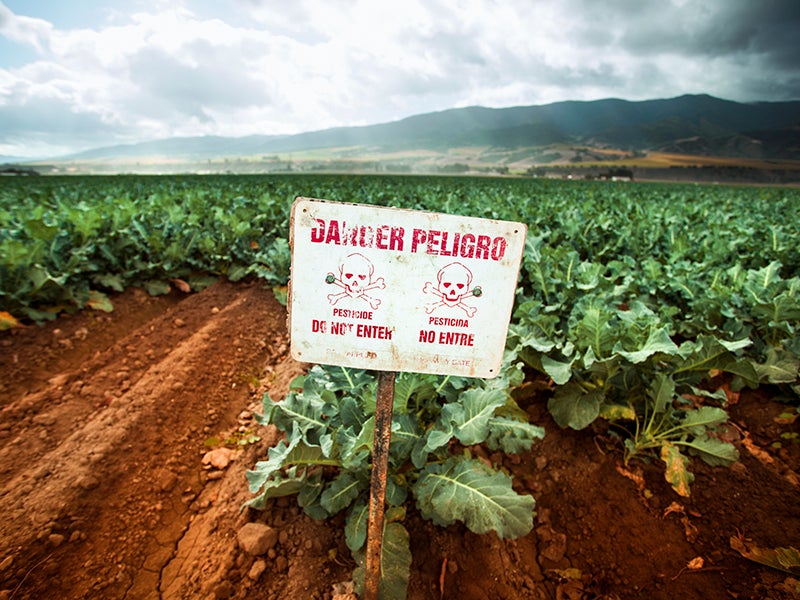The House Farm Bill is Really a Harm Bill
The bill on which representatives will vote this week is a disaster not only for our wildlife, but also for a nation that needs to be fed.

This page was published 7 years ago. Find the latest on Earthjustice’s work.
This week, the House of Representatives will vote on H.R. 2, commonly known as the Farm Bill. Passed roughly every five to seven years since the 1930s, the Farm Bill funds our nation’s food security, nutrition and conservation programs. But H.R. 2 would be more accurately called the “Harm Bill.” If it passes, it will lead to land degradation, toxic chemical exposure for farmworkers, and the loss of endangered species.
The House Farm Bill hearkens back to a pre-EPA, pre-environmental-law era when pesticide exposure almost drove the bald eagle, our national icon, to extinction. Back in 1962, bald eagle eggs were so brittle from the pesticide DDT that they cracked at the slightest touch. After writer and conservationist Rachel Carson’s book Silent Spring exposed how DDT was causing cancer in people and widespread wildlife deaths, the resulting spike in environmental consciousness helped lead to the creation of the EPA. But this year’s Farm Bill contains sweeping language that could increase human and wildlife exposure to a wide variety of DDT-like toxic chemicals.
If the bill passes in its current form, pesticide applicators will be able to spray poison directly into our water supplies without any meaningful oversight and kill pollinators, salmon, whooping cranes, California condors, and other species without any liability. This directly undermines work that Earthjustice has done for years to protect salmon from pesticides. Just this past December, the National Marine Fisheries Service found that organophosphates are a major threat to salmon and orcas. If the Farm Bill passes, critical Endangered Species Act protections to help keep wildlife safe from toxic pesticides would be eliminated.
The bill is a disaster not only for our wildlife, but also for a nation that needs to be fed.
As farmers well know, pollination is critical to our food system. One in every three bites of our food depends on honeybees for pollination. Bees—along with birds, bats and other insects that assist plants in their reproduction—are highly vulnerable to pesticide exposure. And pesticides and pollination aside, the Farm Bill imposes draconian requirements to receive SNAP (food stamp) benefits for those most in need.
At a time when Earthjustice is fighting to maintain safeguards for the workers who help put food on our tables, like the Agriculture Worker Protection Standard and the Certification of Pesticide Applicators rule, the Farm Bill will facilitate more pesticides going to market. It also seeks to reauthorize a pesticide registration program for industry without preserving worker protections that some senators have rightly pushed for, including provisions that would prohibit children from applying pesticides. There are approximately 500,000 child farmworkers throughout the country. Their work should not include handling the most toxic products known to society, and they should not be deprived of information about the pesticides to which they are exposed, but this legislation could help make that a reality.
The Farm Bill should be a non-starter for its pesticide provisions alone, but that’s not all. It also…
- Cuts funding to conservation programs, like the Conservation Stewardship Program, by almost $1 billion. These programs are essential for advancing soil health, water quality and wildlife habitat on farm land.
- Promotes logging in critical areas. National forest stakeholders will lose out to the timber industry through waivers of the National Environmental Policy Act, the Endangered Species Act and a provision that seeks to allow development of Roadless Rule areas.
- Erodes our democracy. The bill prevents states from implementing stronger agricultural protections and in so doing, restricts our right to enforce stronger state agricultural law, while expanding judicial access for industry. Congress should not pick winners and losers in litigation, by limiting the rights of Americans to be heard in court.
In 1962, it was a lack of environmental policy that poisoned our water, workers, and wildlife. In 2018, it may be these misguided policy choices.
Established in 1989, Earthjustice's Policy & Legislation team works with champions in Congress to craft legislation that supports and extends our legal gains.